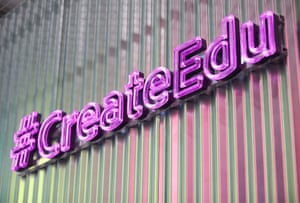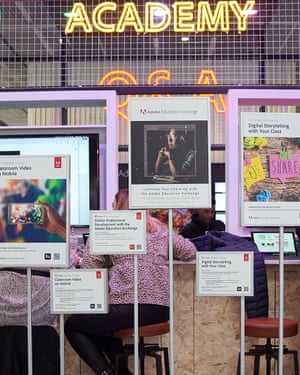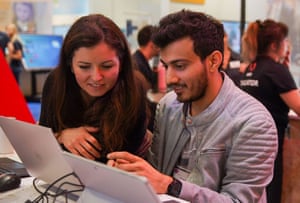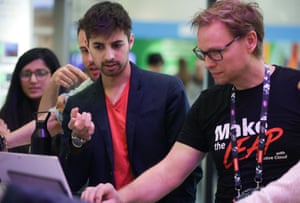Happiness? There’s an app for that: business students design solutions for wellness in education | Tomorrow’s campus today
Raising the digital literacy of the workforce of tomorrow is high on the agenda for educators. They know that students of all disciplines will need to continuously master new technology as it rapidly reshapes the way we work and learn.
Creating digitally literate workers will require a change in how we educate the next generation – an approach that demands greater collaboration between education and industry, and one that gives students more hands-on experience.
This forward-thinking approach was on display at the Student Saturday competition during January’s Bett education technology conference at London’s Excel centre. Here, university students raced to devise an edtech app in four hours.
Using Adobe XD software, four teams of mostly business students prototyped an app designed to solve a challenge facing teachers. They also produced a 30-second crowdfunding video via Adobe Premiere Rush; learning how to communicate ideas creatively.
“There is a misconception that such software is just for creative types – photographers and film-makers,” says Sebastian Distefano, global manager of strategic development, higher education at Adobe.

“But our applications and tools really support skills development that any student needs in today’s workforce. Considering most companies are struggling to find people with skills in the digital area, Adobe Creative Cloud is supporting business students who are going to be innovative in the workplace.”
The students all chose to address pupil or teacher wellbeing, reflecting the student mental health crisis at universities and severe teacher shortages in the country.
Coventry University takes on stressful work bottlenecks
Zakaria Abdullahi, a digital marketing student at Coventry University, explains that high levels of stress forced him to take a gap year. “I think everyone suffers from it, to be honest,” he says.
His team prototyped a time-management app for university students. Uni Mind included a colour-coded to-do list, with red items being the most urgent and green the least. Several studies show a significant negative correlation between students’ time-management skills and anxiety; suggesting that efficiency may help to curb stress.

Users would also select an emoji that best suits their mood, such as “happy” or “moody”. The app would add more breaks into their schedule on bad days and vice versa.
Cambridge Judge MBA candidates hope to signpost early depression
A group of Cambridge Judge Business School MBA candidates also wanted to support student wellbeing.
Through their Grow app, school pupils would provide measures of their happiness, indicating how energetic they feel on a scale of zero to five, for instance.
Teachers would monitor the data (if the student agrees to share it), to spot signs of stress and make an early intervention. “Even if the data were anonymised, the teacher would know there is someone who is possibly depressed and could do activities to up the morale of the class,” says team member Akshar Mehta.
Also, the app would include a Mental Gym – featuring meditation tips andgames designed to boost wellbeing.



A second group of MBA students from Cambridge Judge aimed to reduce teacher burnout and improve retention. In their app, Wellbeing Analytics, schoolteachers would regularly answer several questions about their wellbeing, such as how much overtime they had worked that week, which may indicate stress levels.
Artificial intelligence would efficiently collate responses to build a snapshot of wellbeing across a school, whose leadership could benchmark the anonymised data against industry norms.
“If there are a lot of behavioural issues [with kids, reported by teachers] then maybe you want to bring in some specialist training on what to do,” explains team member Ceri Sharma.
Teesside University Business School students look to offer anonymous advice
Meanwhile, an all-female team from Teesside University Business School designed the Help Bot app. It would include tips for exercising, eating healthily and budgeting at university, as well as a chat feature where students could speak anonymously to a peer or academic, who would volunteer to offer advice.

One study among army personnel found they were nearly three times more likely to report sub-threshold and probable PTSD when completing surveys anonymously, than when they were identifiable, largely because of perceived stigma. As a result, the option of anonymous reporting may encourage students to disclose their problems and seek support.
“An app is a way to seek help without feeling pressured to reveal your identity or feel uncomfortable walking past [a volunteer adviser] in the street,” says Megan Sheela Maguire, from the team of undergraduate business students.
Judging and the result
The contestants were judged on how easy it was to navigate around the app, and how well the design fitted the theme, in this case mental health. The videos were assessed based on how well they engaged and informed viewers, and built brand awareness.
After fierce deliberation, the judges crowned the Teesside team as the winners. They each won a £50 Amazon voucher and a Creative Cloud membership, with access to all the Adobe apps for a year.
Teesside team member Abbie Waldby says the experience elevated her digital literacy and networking skills: “It was a great opportunity to link our business acumen with technology skills.”

-
Ceri Sharma, left, another Cambridge student, suggested their app could help identify training needs
Echoing these benefits of the challenge, Distefano says: “The students are going into a workforce that’s going through rapid digital transformation. So having an understanding of how to take their ideas and put them into digital practice is incredibly important.”
Mark Andrews, digital learning programme manager at Cambridge Judge, adds that experiences such as this develop students’ collaboration, communication and problem-solving abilities, which, he says, employers are crying out for.
With such prospects, more universities may look at adopting this approach to learning. “Increasingly, higher education has to work with industry to pair academic theory with practice, so that students can be productive from day one in a job,” Andrews adds.
• In the UK, Samaritans can be contacted on 116 123 or email jo@samaritans.org. You can contact the mental health charity Mind by calling 0300 123 3393 or visiting mind.org.uk
• In the US, the National Suicide Prevention Lifeline is 1-800-273-8255. In Australia, the crisis support service Lifeline is 13 11 14. Other international helplines can be found at befrienders.org
